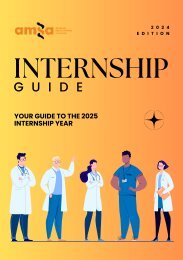AJGH Nexus - Volume 17 2023
AMSA Journal of Global Health (AJGH) 2023 Issue "Nexus"
AMSA Journal of Global Health (AJGH) 2023 Issue "Nexus"
Create successful ePaper yourself
Turn your PDF publications into a flip-book with our unique Google optimized e-Paper software.
education.[8] This results in students, and<br />
future trainees and consultants, not having<br />
the skills, knowledge, or confidence to<br />
incorporate nutrition into a patient’s medical<br />
care.[8] To address this gap in knowledge,<br />
AGHI will conduct workshops to teach<br />
delegates the practical skills and knowledge<br />
related to nutrition and its impact on NCDs.<br />
II. NCDs and Disaster Management<br />
While nutritional imbalances and longer<br />
lifespans have been scrutinised thoroughly in<br />
scientific literature as contributors to the<br />
increasing burden of NCDs worldwide, the<br />
role of climate change and disasters has not<br />
been equally delineated. NCDs, which are<br />
often treated with coordinated care across<br />
medical specialties, require prolonged or<br />
continuous care and can reduce individuals’<br />
capacity to manage during emergencies.[9]<br />
When disasters destroy the health<br />
infrastructure in a region, those individuals<br />
with NCDs are at risk of having acute<br />
complications or a worse prognosis as their<br />
care is interrupted.[10] For example, heart<br />
attacks and strokes are 2-3 more likely than<br />
normal to occur during emergencies.[9]<br />
Furthermore, self-care may become<br />
secondary to dependency on care by others<br />
in patients with NCDs during catastrophic<br />
situations. Ryan et al.[10] reported that factors<br />
affecting self-care, such as medicinal access<br />
and stress, as well as those aspects which<br />
required care by others, such as slow-healing<br />
sores and shortness of breath, were both<br />
concerns among Queensland residents with<br />
NCDs who had experienced disasters.<br />
Multiple scenarios that affect chronic diseases<br />
after disasters can be theorised. Acute health<br />
events, such as the incidence of mosquitoborne<br />
flaviviruses in affected areas within<br />
Australia after the 2022 flooding,[11] could<br />
increase complications among those who have<br />
NCDs or create the basis for compromised<br />
immunity that can cause cancer in the long<br />
term. Disasters can also affect the social<br />
determinants of health underlying the severity<br />
of NCDs. A report on past flooding events in<br />
Australia revealed the greater impact that<br />
disasters have on lower income households<br />
and vulnerable communities.[12] For example,<br />
Aboriginal communities experienced more<br />
displacement during the 20<strong>17</strong> floods in New<br />
South Wales which was tied to worse<br />
outcomes for chronic health conditions.[12]<br />
Since individuals with NCDs depend on access<br />
to specialised technologies or medicine as part<br />
of their personalised treatment plan, factors<br />
relating to equity and distributive justice are<br />
necessary to address by any national policy<br />
on disaster risk reduction.[2, 9] By<br />
implementing the recommendations of the<br />
United Nations’ Sendai Framework for<br />
Disaster Risk Reduction (2015-2030), which<br />
recognises the importance of including<br />
individuals with chronic diseases in policies<br />
regarding healthcare and disasters as well as<br />
stockpiling medicines for chronic conditions.[2]<br />
Australia can build more resilient and thriving<br />
communities that have reduced disparities in<br />
health post-disaster. Furthermore, the Royal<br />
Commission on National Natural Disaster<br />
Arrangements highlights the importance of<br />
training primary care practitioners on treating<br />
individuals during mass emergencies.[3]<br />
To explore these topics in detail, AGHI will<br />
host simulation-based workshops and<br />
discussions that will further inform medical<br />
students about the need for greater<br />
advocacy for vulnerable communities and<br />
policy which specifically advises on postdisaster<br />
management of patients with NCDs.<br />
For more information about the speakers and<br />
the program, please visit the AMSA Global<br />
Health Intensive website<br />
(https://globalhealth.amsa.org.au/amsaglobal-health).

















